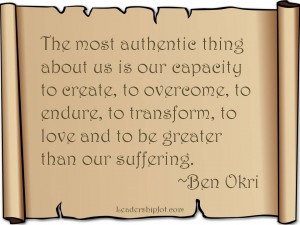

In 1978, he left Nigeria for London, which he considered the home of literature, and two years later published his first novel, Flowers and Shadows, in the Longman “Drumbeat” series, a showcase for recent African writing.

While the violence of the Nigeria–Biafra war of 1967–70 greatly affected the young boy, life in Lagos sparked his imagination, teaching him that “there was no one world-view, but as many worlds as there are ways of seeing.” As a teenager, he closely observed his father practicing law and taking up the cases of destitute people, which led him to develop a fascination for human beings and more particularly the voiceless and unheard victims of social inequalities. In 1991, the publication of The Famished Road marked the emergence of a unique literary voice, that of a writer who was born in 1959 in Minna, a railway town in central Nigeria, 19 months before his country’s independence, lived in London between the ages of one-and-a-half and seven, reluctantly traveled back to Nigeria with his parents and siblings in 1966, and eventually decided to settle in Great Britain at the age of 19. A child of miracles, who knows no boundaries and observes what surrounds him with eyes wide open, Azaro is our very special guide into Okri’s enchanting and terrifying worlds. “I felt on the edge of reality.” These are the words uttered by the narrator of The Famished Road as he recalls his venturing to a location that looked like “a strange fairyland in the real world.” The sentence perfectly encapsulates the ambivalent and fragile position of a child whose wanderings take him and the readers of Ben Okri’s third novel to a multiplicity of places set in the real or the supernatural realm, or a mixture of both.


 0 kommentar(er)
0 kommentar(er)
